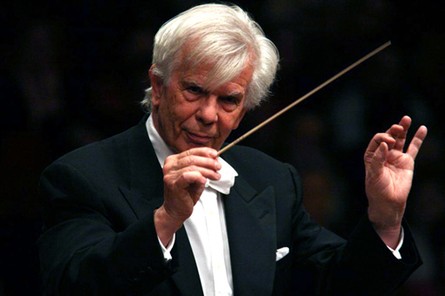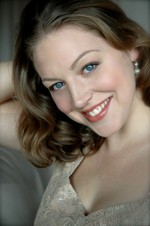Ariadne auf Naxos at Tanglewood
Rising Stars in Student Production
By: Charles Giuliano - Aug 03, 2010
Ariadne auf Naxos
By Richard Strauss
Libretto by Hugo von Hafmannstahl
Conducted by Christoph von Dohnanyi (August 1 and 2) Keitaro Harada (August 4)
Director, Ira Siff; Set and Costume designer, Eduardo Sicangco; Lighting designer, Matthew McCarthy.
Cast: Hans Pieter Herman (Major-Domo), Elliot Madore (Music Master/ Harlekin), Shea Ownes (A Lackey), Javier Bernardo (An Officer), Cecilia Hall (The Composer), Ta’u Pupu’a (Bacchus/ The Tenor), Justin Welsh (A Wigmaker), Audrey Elizabeth Luna (Zerbinetta), Emalie Savoy (ARIADNE/ The Prima Donna), Patrick Jang (The Dancing Master), Lawrence Jones (Brighella), Martin Bakari (Scaramuccio), David Salsbery Fry (Fruffalsin), Deanna Breiwick (Najade), Kristin Hoff (Dryade) , Emily Duncan Brown (Echo).
Tanglewood Music Center Vocal Fellows
Tanglewood Music Center Orchestra
While this purports to be a student production of Richard Strauss and Hugo von Hafmannstahl’s Ariadne auf Naxos it provided a stunning preview of rising stars.
As the comic actress Zerbinetta, the lithe and luscious Audrey Elizabeth Luna, was both magnificent on the ears as well as easy on the eyes. In a saucy, sexy costume featuring two piece beach ware, the opera is set on the Island of Naxos, Luna slithered about the stage. During the second act in a reflective aria the audience was thrilled with the fioreture in her coloratura showpiece. In the staging of director Ian Siff she romped about during this high point of the opera. She stood on a vitrine containing a sculpture of a snail while kicking away several props. Luna delivered her highest notes while flat on her back. The aria was followed by thunderous applause and bravos.
It was a truly stunning performance and a cameo of what audiences may anticipate this season when Luna makes her debut with the Metropolitan Opera. She will perform the Queen of the Night in Die Zauberflote and later in the season will sing Najade in Ariadne auf Naxos.
My companion last night was so enchanted that he plans to attend her debut in New York. Luna will be a major artist to follow for years to come. She has it all, looks, personality, that magnificent voice, and a dash of theatrical cayenne. Wow.
Emalie Savoy who performed the role of Ariadne/ The Prima Donna, which dominates the second act, is also headed to the Metropolitan Opera in September. She joins the Lindemann Young Artist Development Program. Cecelia Hall, the mezzo-soprano who wears pants as the Young Composer will make her Met debut as the Second Priestess in Gluck’s Iphigenie en Tauride.
These young singers came to Tangelwood this summer to work with the maestro James Levine. The renowned conductor Christoph von Dohnanyi has ably taken over in his absence. Given the overall superb quality of this production these young artists have thrived. We spoke with other vocal fellows last night, not cast in this production, who informed us that the program has been outstanding and among the best available. So the absence of Levine did not have a significant impact this season on the teaching program.
The opera Ariadne auf Naxos is a bit of a conundrum. It hovers between a serious opera, the classical legend of Ariadne, seduced fand abandoned by Theseus on the Island of Naxos, and a farce led by her sturm und drang contrasted against the puckish Zerbinetta with her comic companions. It doesn’t always work as the opera has its bright as well as enervating passages.
The first act, or Prologue, is a mish mash. For this production it was cleverly staged in what appears to be the back stage of an intimate theatre in the home of a mega wealthy patron. He has commissioned two forms of entertainment. On the one hand a serious opera as well as a comic play. Both events are to end promptly by 9 PM for a display of fireworks to entertain his guests.
Rather arbitrarily the Major-Domo, Hans Pieter Herman, in a speaking role informs the Young Composer (Hall) that the patron has decided to combine the two conflicting presentations. While vexed the composer is told that he will be paid the stipulated fee one way or the other. The seductive, shall we say loose, Zerbinetta convinces him that it is possible. She has her way with men producing comic touches. The more so since the composer has no stones in his/her shorts. Strauss took particular delight in composing for that irony here as well as in Der Rosenkavalier. Gender reversal is a familiar trope of classical theatre and opera. Particularly when it is played for comic impact.
The Prologue is a jumble of histrionic characters. The diva like Ariadne and petulant Bacchus add to the pique of egos. While the scampy Zerbinbetta cavorts about with her merry men. They are over the top when compared to the “serious” opera singers. There were even some cart wheels from the light in his loafers Dancing Master (Patrick Jang).
We anticipated more of this farcical comedy in the second act. But while interrupted now and then it was dominated by the sturm und drang of the tale of the abandoned Ariadne. She is accompanied by three maidens who echo her tragic lament. The set is changed to a palace with windows out to the sea (a plot point when Bacchus arrives) and an exit into her “cave.”
There is an unsuccessful night and day contrast between the acts which were written over an interval of several years. When we are presented with the saga of Ariadne the opera is serious which is another way of saying enervating and somewhat turgid. There are soporific elements relieved not quite by the comic interruptions of Zerbinetta and her madcap cohorts. Like the Three Stooges they try to tweak Ariadne out of her melancholy longing for Hermes to escort her to eternity. She confuses Hermes with Bacchus.
The pragmatic and randy Zerbinetta taunts Ariadne. What she needs is not death but a new lover. How true. Enter Bacchus. They exit, literally, into the sunset as fireworks light up the sky. That got a laugh from the audience.
Love as usual conquers all. In this case Ariadne’s melancholy death wish.
Zerbinetta slips back in to get the last word “When a new god comes along, we’re dumbstruck.” Indeed.






